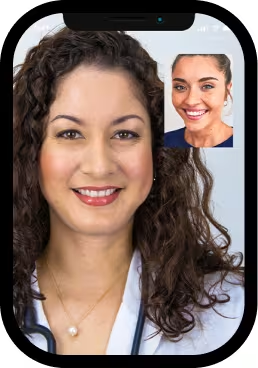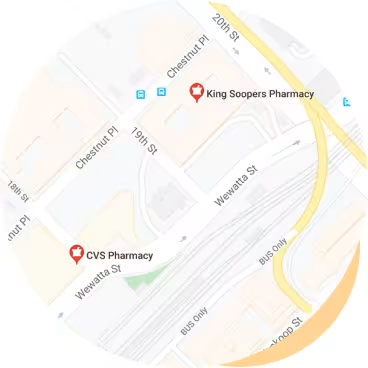- Chronic Care
Crohn's Disease
Crohn's disease treatment available online today
Discuss treatment or specialist referrals for Crohn's disease online from our trusted, board-certified primary care doctors. Get a new prescription to treat Crohn's disease or refill an existing prescription today, if safe to do so as determined by our online doctors.*
Book an appointmentManage IBD symptoms from anywhere
Crohn's disease medications administered by board-certified primary care doctors*
Same-day appointments to evaluate Crohn's symptoms
*Prescriptions are provided at the doctor's discretion. Learn more about our controlled substances policy and how to save up to 80% with our prescription discount card. PlushCare doctors cannot treat all cases of Crohn's disease. Our primary care physicians can conduct an initial evaluation of your symptoms but may need to refer you to a specialist or for in-person treatment. If you are experiencing life-threatening symptoms, seek emergency medical attention immediately.

Learn about Crohn's disease
Crohn's disease is a type of inflammatory bowel disease (IBD). As a chronic disease, Crohn's disease causes inflammation in the digestive or gastrointestinal tract. Crohn's disease can be painful and debilitating, and the disease may lead to serious complications.
Living with a chronic illness can feel overwhelming, but proper treatment can help you manage the symptoms of Crohn's disease.
Crohn's disease causes
Crohn's disease has no specific single cause, but is considered polygenic, in other words that it’s a combination of genetics, the gut-immune system and the gut biome.
Autoimmune reaction: Crohn's disease may be caused by an autoimmune reaction, where your immune system attacks healthy cells in your body.
Genetic factors: Crohn's disease can run in families. If you have a parent or sibling with the disease, you have a higher risk of developing Crohn's disease.
Other factors: Research suggests that people who smoke, people who get less than 6 hours of sleep regularly, and people who take certain medications including oral contraceptives, NSAIDS and frequent oral antibiotics have a small increased risk of developing Crohn’s disease.
Crohn's disease symptoms
The symptoms of Crohn's disease can range from minimal to severe, and most people with Crohn's disease develop symptoms gradually. Some people may also experience long periods with no symptoms.
When Crohn's disease is active, symptoms can include:
Fatigue
Rectal bleeding
Mouth sores
Reduced appetite or weight loss
Anal fissures and/or fistulas
Your symptoms may vary depending on the location and severity of your inflammation. Stress can worsen symptom flare-ups, and certain foods can trigger or worsen symptoms for some people.
*Disclaimer: You should seek emergency attention immediately if you are experiencing severe or life-threatening symptoms such as high fever, shortness of breath, nausea, vomiting, or unexplained weight loss.

How to treat Crohn's disease
Although treatment does not cure Crohn's disease, there are several treatment options to help reduce symptoms. Depending on your symptoms, your doctor may recommend:
Medications, such as oral anti-inflammatory drugs, biologic therapies or rarely antibiotics
Dietary changes to avoid symptom flare-ups
Going without food or drink for several days to help your intestines heal (bowel rest)
Surgery to treat complications, such as intestinal perforations
Crohn's disease medication
There are medications to treat Crohn's disease inflammation and symptoms. They may include:
Anti-inflammatory drugs
Such as corticosteroids like oral budesonide or oral prednisone
Anti-TNF antibody therapies (medications with monoclonal antibodies)
Immune system modulators
Azathioprine
Methotrexate
The initiation and management of anti-TNF antibody therapies or immune system modulator therapies for Crohn's Disease are usually done by specialists such as Gastroenterologists. At this time, PlushCare does not have any gastroenterologists, but our primary care physicians are able to refer you to one if needed.
Antidiarrheal medication
loperamide (Imodium A-D®)Probiotics
Antibiotics

How to prevent Crohn's disease
Because doctors don't know the exact cause of Crohn's disease, it cannot be prevented. However, healthy lifestyle choices can help reduce risk of getting IBD, reduce symptoms, and manage flare-ups:
Eating a healthy diet and avoiding high-fiber foods during a flare-up
Keeping a food diary to track foods that cause flare-ups
Refraining from smoking
Regularly exercising
Getting 7 or more hours of sleep each night
Avoiding frequent antibiotic use
Finding healthy ways to manage stress

When to see a doctor for Crohn's disease
Talk to your doctor if you experience severe symptoms, such as:
Severe abdominal pain
Bloody stool
Severe diarrhea or constipation
Extreme weight loss
High fever
Nausea and vomiting
Inability to pass gas
Weakness or fatigue
Related Conditions with symptoms similar to Crohn's Disease
Irritable Bowel Syndrome (IBS)
Irritable bowel syndrome is a chronic gastrointestinal disorder that affects the large intestine.
Abdominal pain
Many people with Crohn's disease experience cramping and abdominal pain, especially around the lower right side of their abdomen. Talk to your doctor if you experience severe pain.
Ulcerative colitis
Like Crohn's disease, ulcerative colitis is a type of inflammatory bowel disease. With UC, abnormal immune reactions can cause inflammation and ulcers on the inner lining of the large intestine.
Crohn's disease treatment FAQs
What are the early warning signs of Crohn's disease?
Some of the earliest signs of Crohn's disease include appetite loss, abdominal pain, and nausea. These symptoms can come on gradually, and it's easy to ignore them. If you experience new gastrointestinal symptoms, it's important to talk to your doctor.
Is Crohn’s diesease curable?
Unfortunately, there's no cure for Crohn's disease. However, treatment can help people with Crohn's disease manage symptoms, reduce flare-ups, and live a healthy life.
What complications can be caused by Crohn’s disease?
Without treatment, Crohn's disease can lead to serious complications, such as:
Intestinal blockage
Anal fistulas or fissures
Malnutrition
Ulcers in the mouth, intestine, anus, or perineum
Abscesses
Inflammation in other areas of the body
What is the best treatment for Crohn's disease?
There's no one-size-fits-all treatment for Crohn's disease, and the best treatment will depend on your specific symptoms. It is always important to have a local GI/Crohn’s disease specialist involved in your care. Your doctor may recommend prescription medications, bowel rest, or surgery to provide symptom relief.
What foods should you avoid if you have Crohn's disease?
If you're having a flare-up, avoid eating trigger foods to avoid making symptoms worse. Some common trigger foods include:
Whole grains
Nuts and seeds
High-fiber fruits and vegetables
Alcohol and caffeine
Greasy, fatty foods
3 simple steps to request consultation for Crohn's disease today

Step 1
Book a Crohn's disease consultation request appointment.
Book a same day appointment from anywhere.

Step 2
Talk to your board-certified primary care physician regarding your Crohn's disease symptoms.
Visit with a doctor on your smartphone or computer.

Step 3
Pick up a prescription to treat Crohn's disease, , if recommended by your doctor. Referral to a local specialist or labs, if appropriate, may also be advised
We can send prescriptions to any local pharmacy.
Crohn's disease consultation pricing details
How pricing works
To request treatment for Crohn's disease and get a new or refill on your prescription, join our monthly membership and get discounted visits.
Paying with insurance
Membership
$16.99/month
First month free
Visits
Copay
30 days of free membership
Same-day appointments 7 days a week
Unlimited messages with your Care Team
Prescription discount card to save up to 80%
Exclusive discounts on lab tests
Free memberships for your family
Cancel anytime
Visit price with insurance
Often the same as an office visit. Most patients with in-network insurance pay $30 or less!
We accept these insurance plans and many more:
Paying without insurance
Membership
$16.99/month
First month free
Visits
$129
30 days of free membership
Same-day appointments 7 days a week
Unlimited messages with your Care Team
Prescription discount card to save up to 80%
Exclusive discounts on lab tests
Free memberships for your family
Cancel anytime
Visit price without insurance
Initial visits are $129.
If we're unable to treat you, we'll provide a full refund.
Crohn's disease treatment resources
Sources:
PlushCare is dedicated to providing you with accurate and trustworthy health information.
Cleveland Clinic. Crohn's Disease. Accessed on June 25, 2022. https://my.clevelandclinic.org/health/diseases/9357-crohns-disease
Crohn's & Colitis Foundation. What Is Crohn's Disease? Accessed on June 25, 2022. https://www.crohnscolitisfoundation.org/what-is-crohns-disease
Mayo Clinic. Crohn's disease. Accessed on June 25, 2022. https://www.mayoclinic.org/diseases-conditions/crohns-disease/symptoms-causes/syc-20353304
National Institute of Diabetes and Digestive and Kidney Diseases. Symptoms & Causes of Crohn's Disease. Accessed on June 25, 2022. https://www.niddk.nih.gov/health-information/digestive-diseases/crohns-disease/symptoms-causes
PlushCare content is reviewed by MDs, PhDs, NPs, nutritionists, and other healthcare professionals. Learn more about our editorial standards and meet the medical team. The PlushCare site or any linked materials are not intended and should not be construed as medical advice, nor is the information a substitute for professional medical expertise or treatment.